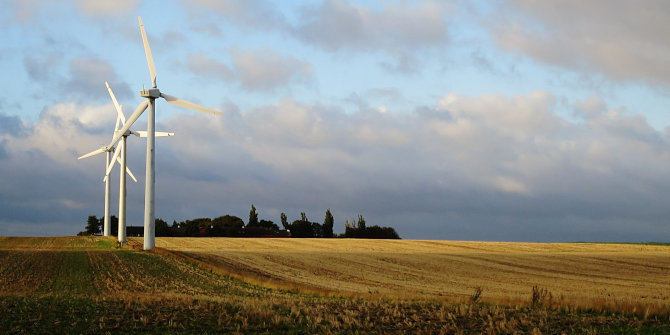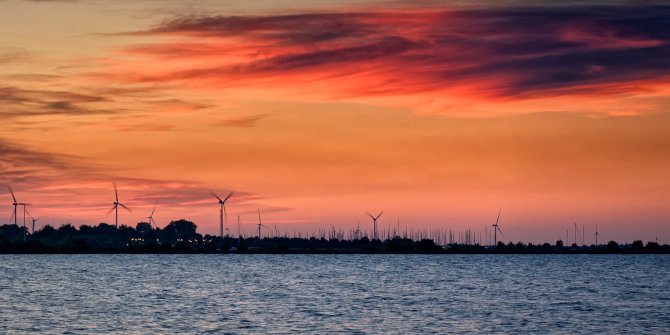 At the end of 2019, the European Commission announced a ‘Green Deal’ for Europe. Vanessa Buth argues that the current strategy is unlikely to be enough to reach the goals set out in the Paris Climate Agreement.
At the end of 2019, the European Commission announced a ‘Green Deal’ for Europe. Vanessa Buth argues that the current strategy is unlikely to be enough to reach the goals set out in the Paris Climate Agreement.
The EU’s Green Deal, which was proposed by the European Commission in December 2019, is a roadmap for how to reach the newly set climate goal of a 50-55 per cent emission reduction in emissions by 2030, as well as a net-zero emission economy by 2050. It outlines policies and measures, including financial support, which should help enable the EU and its member states, in a collective effort, to reduce emissions sufficiently. The Green Deal covers areas such as energy, construction, agriculture and transport, and further develops both the concept of ‘circular economy’, as well as the EU’s biodiversity strategy. The details of how existing policies will have to be adapted and new ones introduced will be worked out over 2020 and 2021.
However, the plan as currently constituted is not enough. The Green Deal remains “a new growth strategy”, based on the same ideology that led us into the climate crisis. Although the aim is to reduce the carbon-intensity of our lifestyle, it is continuing the path of increased growth. It allows continuous extraction and consumption of unsustainable and non-renewable resources, with natural gas – specifically the less carbon intensive liquefied natural gas – as an important part of the energy strategy for an (indefinite) transition period, including carbon-capture and storage (which is a long-term strategy by default).
Other examples are the aim to increase flight capacity and although the Commission wants to support research and innovation, for example for zero-carbon steel-making processes and climate neutral and circular products in the most energy intensive sectors (this includes construction), the main focus of the measures mentioned for the building sector are resource and energy efficiency. These measures, seen in context with a growing population, will curb emission curves, but they are limited and will, on their own, not be enough to achieve net-zero emissions.
There are wide-spread claims from scientists, NGOs and other experts, that the 50 per cent goal by 2030 is not enough to limit global warming to 1.5 degrees, and a more drastic reduction in emissions is necessary. Demands for cuts range from 65 to 75 per cent by 2030 in the EU and net-zero emissions should already be reached by 2035-40. This is because warming projections vary, and because the efforts we make now will impact the emissions curve until 2050 and after.

Credit: Per Jensen (CC BY-NC-SA 2.0)
The speed and intensity with which we act is decisive: the more moderate we act, the more effort will be needed to try and contain global warming to an average 1.5 degrees – if that’s still possible. EU Climate NGOs further stress that the EU should choose strategies that avoid a temporary overshoot of the 1.5 degree objective and which consequently also rely least on unproven removal technologies (this includes carbon capture and storage) to bring the temperature back below 1.5 degrees in case of overshoot. They are not the only experts judging that the development and deployment of sustainable negative emission technologies at a global scale is unreliable today.
To further exemplify the contradictory logic in the Green Deal, take the international and bilateral trade agreements, most importantly the EU Investor Dispute Treaty, intrinsic to our competitive growth economies. Part of the latter are the investor state dispute settlement (ISDS) mechanisms, where businesses can take governments to court in the case of sudden policy changes, if they see their actual and potential (future) profits denied.
In practice, this means that the Netherlands’ plan to phase-out coal as part of its strategy to meet the Paris Agreements’ requirements is in jeopardy because German fossil-fuel companies are threatening legal action and are asking for financial compensation for the closure of their coal plants. Similar cases have happened in Abruzzo/Italy, in Rosia Montana/Romania and the list goes on. Even parts of the Green Deal itself, according to EU Watch Dog Radio, have been watered down already due to threats by the US government to sue the EU using the WTO’s dispute settlement mechanism.
The European Investment Bank (EIB) will play an important role in financing the Green Deal, with an expected prominent role for private finance. The NGO Counter Balance raises serious concerns about the EIB’s ability to tackle fraud and corruption in its 2019 EIB corruption report, since the EIB was found to continue funding certain projects that were under investigation for serious fraud. Further, European law on anti-money laundering does not apply to the EIB. It can ultimately control the use of its funds. At the same time, it does not control the identity of its clients – in other words, who is behind the company receiving (Green Deal) funds.
An extremely contradictory development is the European Commission awarding a contract to the US investment fund BlackRock for paid advice on the integration of social and environmental objectives into European banking regulation – i.e. how to make European funds more sustainable. Black Rock is one of the most powerful financial companies in the world, managing over €6 trillion in assets and is known to be a key investor in fossil fuels.
The Green Deal therefore risks taking Europe in the wrong direction. It is creating strategies designed to fit in with the “growth-first” strategy, and that is why the focus is on the “energy-efficiency first” principle and on the digital transformation in an illusory attempt to “carbon-save” us out of the crisis. What we need instead is a revolution in our lifestyles. We need a radically different way of thinking. We need to tap into existing movements and forms of organisation that have a “healthy eco-system-first” strategy and apply indicators that do not reflect quantitative production capacity (GDP), but that reflect the improvement of our (qualitative) wellbeing. Without this change, we cannot reach net-zero emissions and we cannot contain global warming to 1.5 degrees.
To connect economies with people’s wellbeing, people need to be at the centre of any system: they need to be the ones designing and adapting the management of their livelihoods to the specific characteristics, conditions and environments of their communities to make sure their needs are met. At the same time, we need to develop widespread eco-literacy and define basic premises and principles that restrain human demands on the biosphere for these communities to truly be sustainable – or, put a better way, we need to learn to live in harmony with nature. These principles have in fact already been developed in detail by international civil society actors in a concerted and democratic effort, the ‘Earth Charter’. A document featuring sixteen principles to enable a “more just, sustainable and peaceful world” which was developed by the independent Earth Charter Commission drawing on a world-wide consultation process.
How do we organise such systems? To answer this question we need to study existing structures that could serve as an inspiration – such as existing people’s assemblies, the transition network, regenerative growth and eco-communities – and tap into current movements trying to establish independent citizen assemblies, for example at the EU level. Ultimately what is needed is organisational structures that enable opinion- and decision-formation amongst civil society to facilitate a humane lifestyle in harmony with nature.
Please read our comments policy before commenting.
Note: This article gives the views of the author, not the position of EUROPP – European Politics and Policy or the London School of Economics.
_________________________________
 Vanessa Buth – University of East Anglia
Vanessa Buth – University of East Anglia
Vanessa Buth holds a PhD in Political Science from the University of East Anglia. She has worked as a Senior Research Associate on Brexit and in large independent research projects for the European Commission.



